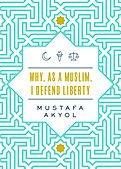Some prominent interpretations of Islam, the second-largest religion in the world, defy human freedom by calling for the punishment of apostates and blasphemers, the imposition of religious practices, or discrimination against women and minorities. In his new book published by libertarianism.org, Why, as a Muslim, I Defend Liberty, Cato Institute senior fellow Mustafa Akyol offers a nuanced critique of these problems by acknowledging their roots in the religious tradition. Yet he also shows that there are strong grounds in the same religious tradition to defend freedom of speech and religion and to harmonize Islam with liberal democracy, the market economy, and a peaceful world order. He also reminds us that liberty isn’t merely a Western idea but a universal value also long cherished by Islamic liberals.
Akyol will have a conversation with Prof. Vali Nasr about the main themes in his book, which Nasr defined as “a must-read for Muslims and non-Muslims.” We hope you will join us for this important discussion and look forward to your engaging questions.




